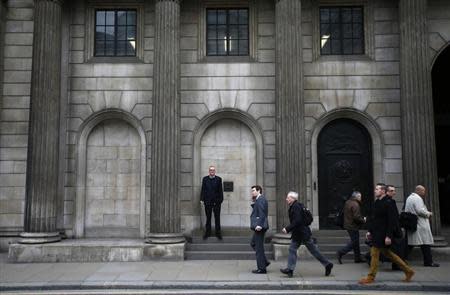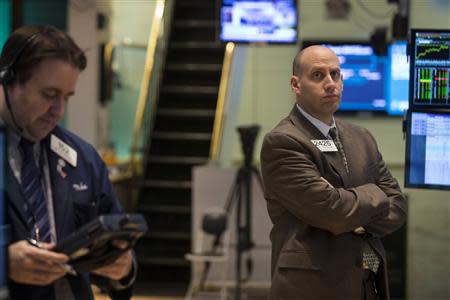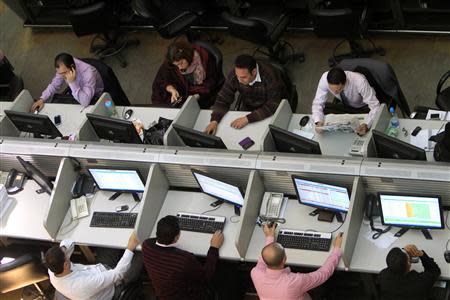Bonds buoyed by Greek return as equity gains fizzle out
By Sudip Kar-Gupta LONDON (Reuters) - Greece's much-heralded return to the bond market buoyed euro zone debt on Thursday, outperforming flat equity markets as gains driven by easing U.S. interest rate concerns fizzled out. Just two years after being at the epicenter of the euro zone's sovereign debt crisis, Greece drew solid demand at a five-year bond sale that aimed to raise 3 billion euros and offered a yield of 4.95 percent, beating Athens' 5 percent target. The country's deputy prime minister Evangelos Venizelos said the sale had been at least eight times oversubscribed. Global equities were more subdued, giving up gains spurred by minutes from the Federal Reserve's last meeting, which suggested officials would be cautious about raising interest rates. Financial markets pushed out expectations of a first Fed rate hike by about six weeks, to July 2015, trading in interest-rate futures showed. That weighed on the dollar, which fell to a three-week low versus the yen and the Swiss franc on Thursday while gold rose nearly 1 percent to a 2 1/2 week high at $1,323.50 an ounce. Futures on the U.S. S&P equity index were down 0.2 percent while futures on the Dow Jones index edged up by 0.1 percent, pointing to a flat start for Wall Street after gains of more than 1 percent on Wednesday following the Fed minutes. In Europe, investors looked optimistically to Greece's successful bond market return for further evidence that the euro zone's economic recovery is gathering pace. Commerzbank strategist Michael Leister said the sale showed Greece was on track in its fightback from a deep economic slump. "It's not a particularly cheap deal for them but they are on the right track and it shows the debt crisis has eased significantly," he said. SteppenWolf Capital chief investment officer Phoebus Theologites was more circumspect, pointing out that Greek unemployment remained stubbornly high and that Greek bonds were a better deal last year when they offered yields at 11 percent. "When they were cheap at 11 percent yield, it was a slam-dunk trade. But this time around, we consider that the hunt for yield has made the fixed income market frothy and, for this reason, we cannot bring ourselves to buy the debt of a country with unemployment at nearly 30 percent," he said. CHINA CONCERNS The Greek bond sale boosted peripheral euro zone bond markets but had little impact on European shares. The MSCI Europe <.MIEU00000PUS> equity index rose 0.2 percent, in line with the global MSCI All-Country World index <.MIWD00000PUS> and the MSCI World Index <.MIWO00000PUS>, which only tracks stocks from developed economies. However, Hampstead Capital hedge fund manager Lex van Dam said equities remained his preferred asset class. He said world stock markets remained buoyed by the efforts of the Fed and other major central banks to support economic growth and keep interest rates low. "This does continue to make me believe that equities are the best play in town." The MSCI Emerging Market index <.MSCIEF> rose 0.6 percent. A drop in China's exports stoked concerns about demand in the world's second-biggest economy, though, and pushed the oil price down towards $107 a barrel. The fall in Chinese exports last month marked the first time they have declined for two months in a row since 2009. China's imports slumped 11 percent last month, data showed, providing another source of concern, although analysts said the trade data may have been distorted by over-invoicing last year. ($1 = 0.7234 euros) (additional reporting by Hideyuki Sano, Blaise Robinson, Tricia Wright and Emelia Sithole; Editing by Toby Chopra and Susan Fenton)





